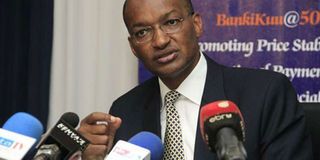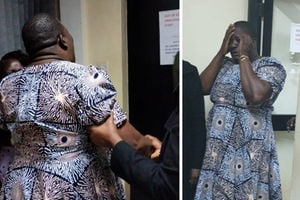CBK will have to take a position on Eurobond scandal

Central Bank of Kenya Governor Patrick Njoroge during a press conference at the CBK on the Monetary Policy Committee decisions as at January 21, 2016. Central Bank opposes MPs’ bid to put ceiling on interest rates. PHOTO | DIANA NGILA | NATION MEDIA GROUP
What you need to know:
- Efforts to assure that the Eurobond money was spent legitimately have failed.
- First, the government remains unable to show the projects represented by the proceeds of this money.
- Secondly, the easiest way to demonstrate the movement of the money would have been to provide the relevant transactional documents that represent this movement.
- Already, the governor has drawn public admiration for his rather alternative lifestyle, shunning the ostentation that is widely considered an entitlement for those lucky enough to land the kind of job he holds and preferring, instead, a simple life at a relatively modest address.
The government’s fightback on the Eurobond scandal has created what looks like a stalemate on what should happen next.
Last week, the government hosted a rare public forum at the University of Nairobi, during which establishment figures provided what was presented as a neutral opportunity to debate the dealings on the proceeds of the fund, a show of official determination to demonstrate that nothing wrong happened to the money.
However, efforts to assure that the Eurobond money was spent legitimately have failed so far because of two reasons. First, the government remains unable to show the projects represented by the proceeds of this money.
Without such projects, it is difficult to make a convincing case on how the money was spent.
Secondly, the easiest way to demonstrate the movement of the money would have been to provide the relevant transactional documents that represent this movement.
These documents are held at the Central Bank. So far, the bank’s role in explaining how the government managed the Eurobond has been peripheral.
Already, the governor has drawn public admiration for his rather alternative lifestyle, shunning the ostentation that is widely considered an entitlement for those lucky enough to land the kind of job he holds and preferring, instead, a simple life at a relatively modest address.
For a man whose previous good jobs would have exposed the governor to huge opportunities to engage in primitive accumulation, Njoroge told Parliament during his vetting for the current job that he does not own any property in Kenya.
It will be interesting how, under Governor Njoroge, the CBK chooses to engage with the debate on the scandal. Already, documents have surfaced purporting to have been authored by the CBK explaining the movement of the money.
While critics have dismissed these documents as fraudulent, the CBK has neither affirmed nor disavowed them.
The next frontier in understanding what happened in Eurobond is, obviously, the CBK. Njoroge would need to consider his position very carefully and decide on how to engage with this issue.
HIGH LEVEL SCANDALS
He would need to remember that other governors have occupied the position before and that some of them were touched by high-level scandals that happened during their watch in ways that then ruined their reputations.
The Goldenberg scandal in particular touched the then governor, Eric Kotut, in ways he is unlikely to be proud of today.
After long delays as others involved in the scandal faced court charges, Kotut was eventually charged in the High Court in 2006, alongside businessman Kamlesh Pattni and former Finance permanent secretary, the late Wilfred Karuga Koinange, with conspiracy to defraud the government and the illegal payment of Sh5.8 billion to Goldenberg International between April and July 1993.
Although Kotut, who spent a long time in court, was finally acquitted by the High Court on a technicality, it is difficult to argue that his reputation remained the same thereafter.
By contrast, his successor, Micah Cheserem, who is seen as having led valiant efforts to restore sanity at the CBK, which had been ravaged by Goldenberg-induced chaos, has gone on to have a thriving career and is today still involved in public life.
The situation facing the country is such that the CBK will have to take a position on the Eurobond scandal. The expectations on the bank are simple, even though they will have profound effects. The bank should make available the relevant transactional information on the movement of the Eurobond billions.
If these details match the narration that the Treasury has so far provided, then it will be clear that no scandal occurred and the relevant public officials will be owed an apology.
If, on the other hand, the CBK stonewalls on this information, it will be clear that it has taken the side of the perpetrators of the scandal. In that event, it will be clear that Njoroge is malleable – a fact that will probably define key relations for the remainder of his tenure.
Njoroge has created the impression that he has no interest in the spoils of office, creating a situation where there is relatively high public confidence in the CBK, an institution that has rarely found itself in such a favourable situation.
The fact that the governor seems unimpressed by material things supports the view that it will not be easy to compromise him in relation to the Eurobond scandal.
However, even upright people can be intimidated, and whatever role the CBK plays in increasing public information on the Eurobond also depends on how much courage the governor can find.
Access to public information is now a constitutional right and the CBK has an obligation to play its role in providing such information. The Treasury has recognised the duty to provide information, periodically putting out information which seeks to portray its version of events.
However, the information that Treasury provided has been selective and, for example, Sarah Elderkin has claimed that there was a deliberate concealment of the details of the holders of the account at the Federal Reserve Bank, into which half of the proceeds of the bond were paid.
Also, the Treasury remains unable to provide a list of projects that the proceeds funded.
During his job interview with Parliament Njoroge said: “I have made many difficult decisions. I weigh situations and back them with data before making decisions.” It is to be hoped that in the coming days, he will make a decision to disclose how the CBK handled the Eurobond money.





